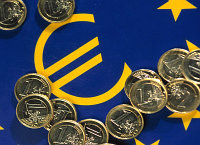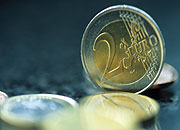New manifesto seeks to revive debate about Czech position in EU
CR: An initiative by several Czech NGOs and members of the country’s business community seeks to stir up debate about the Czech Republic’s position within the European Union. The manifesto, entitled Confident Czech Republic in a strong Europe, calls on MPs and government officials to ensure that Czechs remain at the core of the EU. In this edition of Marketplace, we talk to some of its authors and signatories and looks at what impact, if any, the initiative might have on the Czech debate about the future of the European Union.
At the end of the first day of an EU summit in Brussels last week, Prime Minister Petr Nečas told reporters not being a member of the eurozone had several advantages, one of them being that officials from non-eurozone countries could get a good night’s sleep while the others had to stay up. But the Czech prime minister had no answer when asked if it was a good thing to be left outside the room where decisions about the bloc’s future were being made.
This anecdote well illustrates the Czech government’s attitude to the European Union and its future. Along with the UK, the Czech Republic was the only EU member state to reject the fiscal treaty earlier this year, and members of the centre-right government are openly sceptical about the prospect of joining the eurozone. That’s what brought about the initiative, says one of its authors, Petr Lebeda from the Prague-based think tank Glopolis.
“The initiative came as a reaction to the moves of the government which were steering the Czech Republic away from the core of the EU. We have been discussing the discomfort we feel about this with colleagues in the civil society, and we have also approached some people in the business sphere to find out whether they feel the same about this issue.”
The manifesto claims that while European countries are trying to find a solution to overcome the crisis, the Czech Republic should act as a fair member of the community. Otherwise, Czechs would “lose the most important thing in every healthy relationship – mutual trust”.
 Photo: European CommissionIt would be doubly wrong, the authors say, to aim for a different direction in hard times than is the direction of our neighbours and the neighbours of our neighbours. Losing the opportunity to participate in key economic decisions would place the country on the democratic periphery of Europe. The initiative therefore seeks to start up a new debate about the country’s future in the EU. Petr Lebeda again.
Photo: European CommissionIt would be doubly wrong, the authors say, to aim for a different direction in hard times than is the direction of our neighbours and the neighbours of our neighbours. Losing the opportunity to participate in key economic decisions would place the country on the democratic periphery of Europe. The initiative therefore seeks to start up a new debate about the country’s future in the EU. Petr Lebeda again.
“We would like to come up with a more balanced description of the relationship between the various groups in the Czech society, and open and intensify the debate so that it starts to ‘trickle up’ to the political representation and softly shifts the official position of the government.”
The authors of the manifesto include seven representatives of some of the best known Czech NGOs such as People in Need, Open Society Fund, Transparency International and the environmental group Hnutí Duha. The founder and head of People in Need Šimon Pánek explains his reasons for joining.
“Sometimes it feels like the countries in central and Eastern Europe take it for granted that we joined the democratic part of the world, that we are safe and we have guarantees for the future. But in fact, the geopolitical, economic and other frameworks are changing. In my opinion, this part of Europe has the best chances of being prosperous and democratic if it is part of the core of the EU.”
 Šimon PánekŠimon Pánek, who was one of the student leaders of the 1989 Velvet Revolution before founding one of Europe’s largest humanitarian organizations, says the Czech debate about the EU is too polarized and too vague, and missing some crucial points.
Šimon PánekŠimon Pánek, who was one of the student leaders of the 1989 Velvet Revolution before founding one of Europe’s largest humanitarian organizations, says the Czech debate about the EU is too polarized and too vague, and missing some crucial points.
“There are hundreds of critics of the EU with different points of view. But very few people talk about the benefits and improvements: the quality of life, the rule of law and many other things that are improving also thanks to the fact that we are members of the EU. So we will try to address the public and the media with an appeal to talk more rationally and less ideologically about what it means to be or not to be at the core of the European Union.”
Besides members of leading Czech non-for-profit organizations, seven business people supported the manifesto which they signed as private persons rather than on behalf of their firms. But Šimon Pánek says numbers are not important.
“The number, if we are talking about quantity, of the signatories from the non-for-profit and business sectors, is the same; it’s some 10 or 12 people. It’s not a petition so we will not rush to get more signatures.
“But we know that many business people are increasingly worried about what the alternative is to our being at the core of the EU, and we hope they will join us by discussing the issue, placing it on their websites, bringing the issues up with politicians and in chambers of commerce. We are in touch with several chambers of commerce which are interested in discussing our future position, so we believe it will resonate in the business sector.”
 Constantin KinskyOne of the business people who signed the appeal is Constantin Kinsky, the managing partner of the consultancy Roland Berger, and the head of the Czech-French Chamber of Commerce, who again supported the initiative as a private person. Mr Kinsky says the current debate about banking regulation is a good example of why the Czech Republic should not stand aside.
Constantin KinskyOne of the business people who signed the appeal is Constantin Kinsky, the managing partner of the consultancy Roland Berger, and the head of the Czech-French Chamber of Commerce, who again supported the initiative as a private person. Mr Kinsky says the current debate about banking regulation is a good example of why the Czech Republic should not stand aside.
“How can a state, a government or a central bank ensure that the banking sector, which is the heart of the economy, is stable and does what we need it to do, that is to finance the growth of the economy? The only way left is regulation. So if we isolate ourselves and do not participate in the debate as to how we can construct a European-wide, consistent and efficient regulation system, we will not be able to protect our system.
“We need to be able to find the right balance between the role of the local, national regulator and the consistency of the rules that are imposed on the whole banking sector across the EU. That’s just one example why we should be at the heart of the debate.”
As Prime Minister Petr Nečas and other Czech officials repeatedly noted, the question of the Czech Republic joining the core of the EU is directly linked to adopting the euro and thus joining the eurozone. Mr Nečas says that right now, this programme would not win elections in the Czech Republic. But one of the signatories of the manifesto, investment banker Ondřej Jonáš believes the country needs to make a stand regardless of the euro’s future.
 “I don’t mean to downplay the very serious issues the core countries have to deal with. But so what? Even if the euro falls apart, someone will have to pick up the pieces, and re-assemble a new entity along sensible lines. And the axis it will be assembled on will be Germany – France – Poland.
“I don’t mean to downplay the very serious issues the core countries have to deal with. But so what? Even if the euro falls apart, someone will have to pick up the pieces, and re-assemble a new entity along sensible lines. And the axis it will be assembled on will be Germany – France – Poland.
“We will not have the luxury of standing apart even if you assume the worst case scenarios that the euro as we know it today falls apart. In other words, what I worry about is the psychological attitude, ‘this does not concern us, it’s somebody else’s problem, and we should go fishing’. No.”
The Czech debate about the country’s future in the European Union has been dominated by the Euro-sceptic voices around President Václav Klaus and his lasting influence on party politics, particularly on the Civic Democrats who run the current government. An editor of the weekly Respekt, Kateřina Šafaříková, says that’s one of the reasons the debate has been dormant in recent years.
“The government does not say that they want. We only know what the government has been turning down a vast majority of the proposals that came from Brussels from the start of the euro crisis. So we know the government says no but we don’t know what the government wants and what the government would approve. The debate is therefore almost non-existent, it’s vague and boring. What I see as the biggest problem is the lack of a lively, interesting and influential debate.”
The manifesto is not the first attempt to influence Czech politicians in their views of the EU and the Czech position in it. For the first time, however, it has tried to win support by influential figures from the business sector. But none of the large firms or industry associations have backed it so far, which is why Kateřina Šafaříková says its impact will be very limited.
 Photo: European Commission“What I see as a weakness here is that it is a mere group of individuals who in fact only represent themselves. There are no strong groups behind it, be it companies or influential think tanks. So I don’t think this particular initiative can change anything or inspire a wider debate they are calling for.”
Photo: European Commission“What I see as a weakness here is that it is a mere group of individuals who in fact only represent themselves. There are no strong groups behind it, be it companies or influential think tanks. So I don’t think this particular initiative can change anything or inspire a wider debate they are calling for.”
The authors of the manifesto are planning to hold a series of debates and lectures to make their case. They also hope that a new impulse will come during the campaign to elect the successor of President Václav Klaus in which candidates will be also discussing their stances on the European Union and its future.
